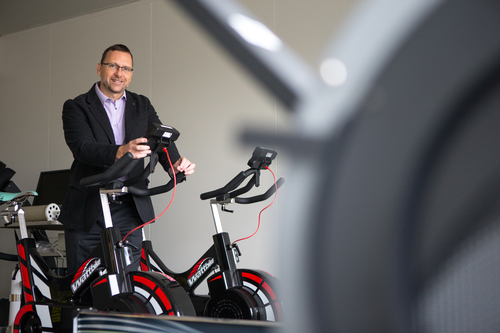Claudia Doman
28 January 2015: Kevin Thompson's love for sport runs in his veins. From an early age, he was part of every school sports team and competed extensively in tennis, track running, football, basketball, rugby and swimming.
Some might think it actually runs in his genes. His mother was a good tennis player and a keen swimmer- she taught him how to swim- and his father used to be a speed-skater.
Professor Thompson is now the director of the University of Canberra's Research Institute for Sport and Exercise (UCRISE). It's a long way from the sporting fields in Saltburn-by-the-sea, the picturesque seaside town in north-east England where he grew up.
After finishing his schooling, he went on to study a Bachelor of Sport Science and Administration with Honours at Nottingham Trent University. His passion for sport science cemented itself during his degree, with his commitment to it going beyond the classroom doors.
"I really enjoyed the science side of the course. My dissertation looked at protein metabolism in distance runners and I had to store urine samples in the house fridge, which my housemates were not very happy about," he jokes.

|
Director of the University of Canberra Research Institute for Sport and Exercise, Kevin Thompson. Photo: Katherine Griffiths. |
When he graduated, he says it was still early days in the field and not many jobs were up for grabs in sport science. He took a graduate position in banking and then moved across to the pharmaceutical industry, until he decided to take a gamble and leave a well-paid job to do a Master of Medical Science at the University of Sheffield.
"On the final week of this course I saw a newspaper ad for a sports science officer position with the Sports Council for Wales- only the second position of sports science support they had ever created- to work with all national teams," Professor Thompson says.
"I got the job and on the first day I found myself in the basement of Cardiff Arms Park, the national ground of rugby in Wales, fitness-testing the Welsh national rugby team!"
"I was working with elite athletes such as Colin Jackson, then 100m hurdle world-record holder; Mark Foster, 50m swimming world-record holder; Darren Campbell, who became an Olympic silver medallist in 200m track and field; Nicole Cook, who would become an Olympic road-cycling gold medallist
in Beijing and the list goes on."
The list does go on. The UK academic worked with the world's top five squash players, the top 10 badminton players, judo champions and even an ice-dancer.
In fact, Professor Thompson has been working with elite athletes for the past 20 years through different elite athlete support positions such as manager of coaching, sports science and sports medicine at the Welsh Institute of Sport, later regional director (north) and then as national director of sport sciences at the English Institute of Sport.
Professor Thompson then decided to enter academia and joined the University of Northumbria, where he oversaw the design and build of a $50 million sport facility, built up the Department of Sport and Exercise Sciences and co-directed the Sport, Exercise and Wellbeing research centre in two-and-a-half years, before heading down under to Australia in 2012.
He decided to move to the nation's capital to work for the University of Canberra because of "the opportunities to collaborate with the Australian Institute of Sport (AIS) and the Australian Sports Commission, as well as the access to a range of elite teams and athletes based in Canberra, such as the Brumbies, the University of Canberra Capitals and Canberra United".
"I wanted to see how sport operated in another country and Canberra was a good challenge," he says.
"There is a momentum in sport at the University of Canberra and I was inspired by the Vice-Chancellor's vision."
Professor Thompson and his team have set themselves an ambitious goal: "We aim for the University to become known as Australia's leading sports university with an international reputation for sport-related studies."
"It is a big challenge but there is a huge amount of will from the University to push the sport agenda forward," the UCRISE director says. "And we have already grown exponentially."
Over the past few years, research student numbers have grown to over 30 and a new Bachelor of Exercise Physiology and Rehabilitation degree and Master of High Performance Sport have been developed. Partnerships are also on the rise with both local and international institutions, including supporting new student scholarships.
"Our aim is to continuously improve the quality of our research in sport related studies by developing and supporting our current staff and students and by attracting high-quality research staff and students to the University" he says.
"But more importantly, we want the University of Canberra to be synonymous with sport; we want to be the place of reference, with quality teaching and research programs."
UCRISE is nestled in the brand new Sporting Commons building with state-of-the-art facilities, shared by local elite sporting teams.
His role as the Institute's director hasn't prevented Professor Thompson from advancing his own research, which focuses on the development and application of sport and exercise science to help coaches and sport scientists achieve high performance. While developing his career, he had completed a PhD part-time at Liverpool John Moores University.
He is currently investigating exercise regulation and pacing in sport, mental fatigue and environmental stress during exercise and other projects evaluating the management practices of high performance sport support teams and, suitably, the future directions of sport institutes.
But Australia is home now for Professor Thompson and his wife and three children.
"I love living in Canberra; there is so much to do and you can get around easily to take the kids to their sport activities."
His son plays football while both his daughters are high-performers in athletics, with one of them recently winning the ACT North schools' 400m track running
competition, proving sport truly runs in the Thompson genes.


